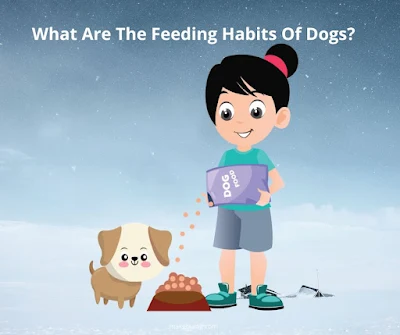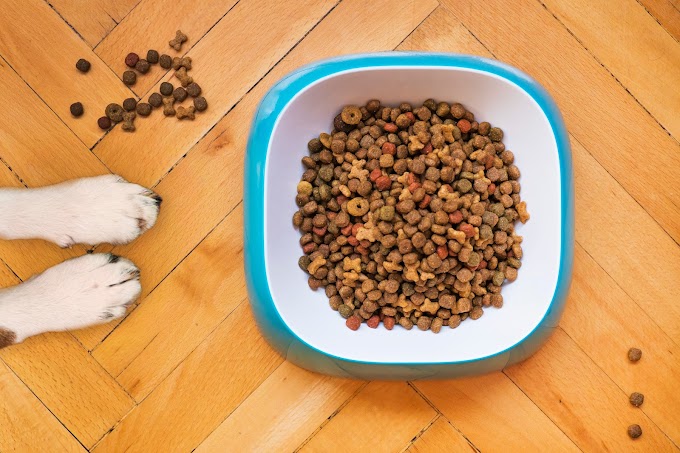Are you worried about the furry companion's feeding schedule? Every dog's mealtime and meal preferences are different, just like humans & labradoodle colors. Some canines are happy to follow a standard feeding schedule, while others exhibit feeding habits.
For instance, You could take 100 dogs of the same weight as 50 pounds, requiring different quantities of food and the right amount of calories to remain healthy and maintain their ideal body weight because every dog is unique.
So before knowing their feeding habits, we first have to understand different traits in dogs and their feeding habits.
1. The Normal Eater
Normal eaters love to follow a regular schedule, and there is no such thing to worry about them. A good meal two times a day that contains the appropriate levels of vitamins and minerals depending on their age is necessary to meet its needs.
One of the most crucial things to keep in mind when feeding your dog is to adhere to the instructions on the food container, follow the chart according to your veterinarian's recommendation, and modify the amount of food based on their level of activity.
2. The Finicky Eaters
Is your furry friend being fussy about his food, sniffing it, and rejecting it after taking a few bites? Then you probably have a picky eater. This selective food intake may be due to various health and behavioral changes. A dog can be picky if sick or doesn't like the food.
So if he's showing odd behavior, observe its activity closely; if he is not taking an interest in daily activities or excited about anything, skipping meals, then it's time for you to see a vet as soon as possible.
But if he's healthy and just showing behavioral changes, then it's time for you to maintain a strict schedule.
Don't give him too many treats; if you don't stop it, then he will lose interest in what you provide him in the bowl as a meal.
Don't offer him several foods; instead, try to Corax one similar food in every meal.
Wait for 30 minutes after giving him a meal and if he doesn't eat it, take it away.
Give him the same food at the next meal time and clarify that no other option is available.
Take the food away if he does not eat and stick to this strategy; your dog will eat it if hungry.
3. The Sensitive Eaters
Some are picky eaters while others are sensitive; this sensitivity might be due to many reasons. One of the core reasons for that is your dog's health, or it could be because your dog is allergic or has an issue with the digestion of food.
Health issues might be dental, stomach, or bloating problems, making it difficult for your dog to intake its food. Foods like slow-cooked, soft, and easy to chew might help you in this regard.
But it's necessary to visit a vet and examine your dog's health condition to better understand the problem and its solution.
4. The Overeater
Weight gain and obesity are the major problems in dogs; weight gain can lead to serious health problems like trouble breathing, hip dysplasia, and heart issues.
A study by the Association for Pet Obesity Prevention (APOP) indicates that 56 per cent of adult dogs are classified as overweight or obese. According to Dr Ernie Ward, APOP founder, "The most distressing finding in this year's study was that more pet owners are unaware their pet is overweight."
Pet owners must understand the sign as early as possible that their furry companion is getting overweight and must control it. One prominent character is to observe them when they are eating; if they ask for more after devouring the entire meal, it's an indication for you.
Another thing you can do is to give a low-fat meal. Feeding these dogs a diet high in fiber and low in grain may help them digest food better and helps to maintain a healthy weight.
Feed them small meals throughout the day instead of one large meal. Please provide them with clean water and plenty of fresh, healthy, organic food, and limit their daily treats.
How Important Is A Feeding Schedule?
A feeding schedule not only improves your dog's physical health but also improves behaviour changes and helps to regulate a healthy mood.
Nutrients found in dogs' foods help their brain function correctly and increase the ability to learn new tricks and things. A good feeding schedule also helps to boost the immune system and make dogs sustainable from many diseases.
How To Develop A Schedule?
Before you develop a healthy eating schedule for your dog, it's crucial first to observe your dog's body condition and whether it is overweight or underweight. Also, consider the breed.
In this regard, you can consult with a vet, and he can provide you with a customized meal chart for your dog.
To develop this feeding schedule, first, you need to look up high-quality food, research, and find some of the best foods for your dogs that provide all the nutrients.
Make sure to give them food in measured quantities so they won't become overweight. For this, you can use measuring cups.
Observe if your dog becomes excited when he sees food or not, and if not, pick up the bowl after 30 minutes.
One mistake that many pet owners make is that they provide food more than a dog can eat and expect it to swallow that whole. Please give them the right amount of food depending on their wants.
Wet Or Dry Foods?
Many dogs prefer wet toppings as they tend to be more flavourful, but giving them both is essential. The main reason your dog avoids eating kibble is that they want something tasteful and don't eat the food in the hope that you will provide something better.
Yet wet food contains more fat and can increase tartar buildup on dogs' teeth. On the other side, dry or processed foods contain chemicals and preservatives to make them more flavourful and can lead to health issues like gingivitis, pancreatitis, and arthritis.
"Wet foods have more water content and would be healthier for those pets with kidney disease or urinary tract issues," says Dr Youello. He adds that wet food might taste better for picky eaters. It could be due to its high protein and fat content (two components essential to a healthy dog diet).
While dry foods support oral health by reducing plaque and tartar buildup, a healthy combination of wet and dry food is good for maintaining dogs' health; switching back and forth from wet to dry food can cause health hazards like digestive or stomach issues in dogs.
Conclusion
Owning a dog is both a pleasure and a responsibility, and owners should fulfil their obligations completely. Due to behavioral problems, mood swings, and health difficulties similar to those that affect humans, dogs can be annoying to feed on time.
The owner has to manage their feeding schedule and provide high-quality food to stay healthy. Remember owning a dog is a privilege, not a right, so ensure you can fulfil their responsibilities before adopting them.











_taxiing_at_Schiphol_(AMS_-_EHAM),_The_Netherlands,_18may2014,_pic-6.jpg)
0 Comments